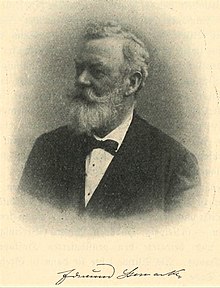Edmund Steinacker
Edmund Steinacker (born August 23, 1839 in Debreczin , Austrian Empire , † March 19, 1929 in Klosterneuburg ; also: Ödön Steinacker ; pseudonym: Sincerus ) was a German-Hungarian publicist and politician .
family
Edmund Steinacker came from the middle-class Steinacker family, which has been documented in Quedlinburg since the beginning of the 16th century . The uninterrupted line-up begins with Hans Steinacker, who was councilor and treasurer of the city of Quedlinburg in 1530 . His grandson was Philipp Steinacker (around 1565–1613), a lawyer and Princely Saxon councilor and court judge at Coburg . Steinacker’s great-grandfather Gabriel Wilhelm Steinacker (* 1743) was a businessman and owner of a bookshop in Dessau , but emigrated to Austria . His grandfather was the Viennese merchant Christian Friedrich Wilhelm Steinacker (1775–1838), owner of a wholesale business.
Steinacker was the eldest son of Gustav Steinacker (1809–1877), the then director of the reformed girls' training and education institute in Debreczen, and his wife Aurelie, born in 1837. Westher (1808–1882), daughter of the cheese maker and councilor Abraham Westher (1773–1844). His father first went to Hanover as a preacher in 1853 and then to Buttelstedt near Weimar in 1857 . Steinacker had three siblings :
- Alexander Steinacker (1841–1904), bookseller, head of the Salt Office in Debreczin with the rank of accountant
- Artur Steinacker (1844–1915), businessman, bank director, British Vice Consul and Councilor of Commerce
- Irma Steinacker (1847–1895), concert pianist ∞ Carl von Radecki, court conductor .
Steinacker married Auguste born in Pest in 1869. Bald. The couple had two sons:
- Roland Steinacker (1870–1962), politician and theologian
- Harold Steinacker (1875–1965), historian and university professor .
Life
Growing up in Hungary , Trieste and Weimar , Edmund Steinacker studied engineering at the Polytechnikum Stuttgart and became a member of the Corps Teutonia . After taking the first state examination in construction, he first worked in Württemberg from 1864 to 1866 , then as government secretary for arts and crafts in Paris . In 1867 he returned to Hungary as a railway engineer for the Hungarian building department. In 1868 he became director of the State Industry Association and in 1869 the syndic of the Budapest Chamber of Commerce and Industry. From 1875 to 1878 Steinacker was Secretary General of the Hungarian State Commission for the Vienna World Exhibition . In 1892 he was forced to retire.
From 1881 to 1888 Steinacker was a member of the Hungarian Reichstag as a member of the Hungarian parliament from Bistritz and Heltau in Transylvania . As a representative of the interests of the German-born Hungarian bourgeoisie, he came into conflict with the Hungarian Prime Minister Kálmán Tisza and his policy of Magyarization, as well as what Steinacker saw as the slow modernization of Hungary's economy and society. He then worked as the first secretary of the Chamber of Commerce and Industry and was retired because of his advocacy for Germans in Hungary.
After moving to Vienna, he was secretary of the tourist association until 1897 . As a member of the Old German Association and the German School Association , he worked as a writer and publicist for Southeast Germany and founded the German daily newspaper for Hungary in 1899 for this purpose . In 1906 he participated in the founding of the Hungarian German People's Party. From 1907 he belonged to the advisory group of the heir to the throne Franz Ferdinand and participated in considerations of an anti-dualist reform of the empire. In 1915 he belonged to a circle around Heinrich Friedjung , who wrote the memorandum from German-Austria . In the 1920s he was committed to minority politics in the Danube and Carpathian region.
Works
- The Malvieux family, on their departure from Kleinhonth, thanked an appraiser for their services . Private print, Vienna 1906.
- Ancestors and descendants of Georg Louis Malvieux and Anna Maria Ludovika Honorata Bassenge . CA Starke, Görlitz 1914.
- History of the Steinacker family . Meinhold, Dresden 1918.
- Memorabilia (= publications of the Institute for Research on German Ethnicity in the South and Southeast in Munich No. 13). Max Schick publishing house, Munich 1937.
literature
- Edmund Steinacker: The story of the Steinacker family in the German Roland book for gender studies , published by the "Roland" association for the promotion of core, coat of arms and seal studies EV, 1st volume, Dresden 1918, p. 325ff.
- K. Schwarz: Steinacker, Edmund. In: Austrian Biographical Lexicon 1815–1950 (ÖBL). Volume 13, Verlag der Österreichischen Akademie der Wissenschaften, Vienna 2007–2010, ISBN 978-3-7001-6963-5 , p. 158 f. (Direct links on p. 158 , p. 159 ).
Individual evidence
- ↑ Bernhard Koerner: German Gender Book , CA Starke, 1914, Volume 28, p. 500
- ↑ 100 years of the Weinheim Senior Citizens' Convention , pp. 135–136. Bochum, 1963
Web links
- Literature by and about Edmund Steinacker in the catalog of the German National Library
- Ingomar Senz : Steinacker, Edmund . In: East German Biography (Kulturportal West-Ost)
| personal data | |
|---|---|
| SURNAME | Steinacker, Edmund |
| ALTERNATIVE NAMES | Steinacker, Ödön |
| BRIEF DESCRIPTION | German-Hungarian publicist and politician |
| DATE OF BIRTH | August 23, 1839 |
| PLACE OF BIRTH | Debreczin , Austrian Empire |
| DATE OF DEATH | March 19, 1929 |
| Place of death | Klosterneuburg |

